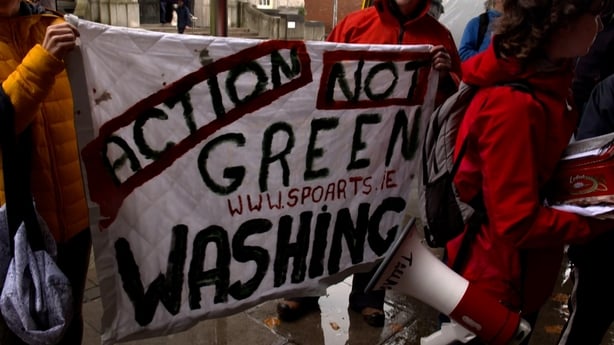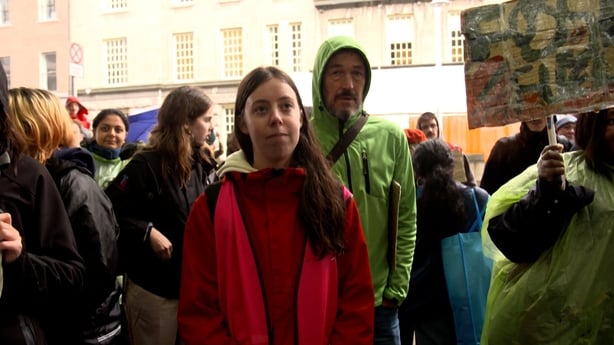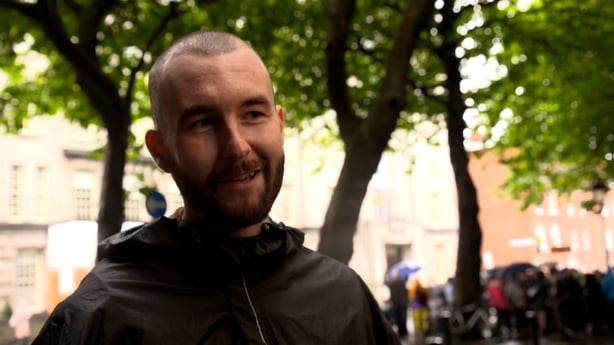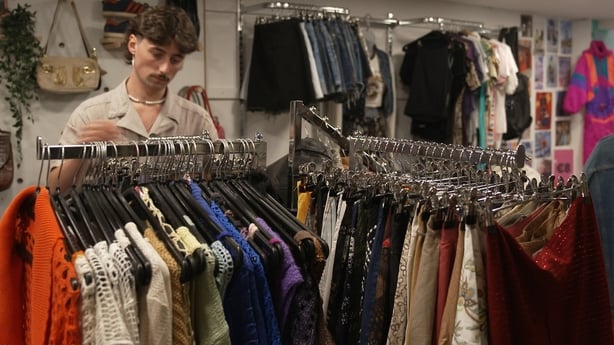When Verena Brunschweiger married her husband at the age of 30, she vowed to never have a child because of the impact it would have on the environment.
Now 43, the Bavarian secondary school teacher is the face of Germany's 'child free’ movement.
"More people, more waste, less resources…that’s it. This is plain logic," she told Prime Time.
Ms Brunschweiger cites a study published in the journal Environmental Research Letters in 2017 that found having fewer children was the most effective way of reducing your carbon footprint.
The study found that having one fewer child has a greater impact on reducing greenhouse gases than other lifestyle choices such as going vegan, avoiding long-haul flying, living car free, eating less meat or washing your clothes in cold water.
"For some people it's too radical. I can understand that. That's why I always suggest - what about voluntarily having only one kid instead?"
"We have one crisis after the next – pandemics, wars, et cetera. This is not a nice world anymore. I'd always say I pity those kids who are born now because I don't want to live what they have to live through," Ms Brunschweiger said.
"We in the western civilised industrialised countries have to cut down on our numbers," she added.
Does her pledge not to have children help her deal with her worries about the future of the planet?
"I don't have a bad conscience," she told Prime Time, as she has not "brought an innocent new being into this world, which is already dying and burning."
"We are in the middle of a climate catastrophe… so it's a win, win situation. I don't inflict this upon a new person.
Her stance is partly borne out of fear about the future of the environment.
She's not alone in that regard. A growing number of people say they are changing the life choices because of concerns about the climate, and the impact it’s having on their mental health.
The World Health Organisation (WHO) now says climate change is "the single biggest health threat facing humanity."
It is having such an adverse effect on some people’s mental health, that climate anxiety, or eco-anxiety, is now a global concern.
What is climate anxiety?
Professional bodies are becoming increasingly concerned about the impact of the climate crisis on people's mental health.
Last month the Psychological Society of Ireland held a special conference about psychology and the climate emergency in Dublin.
One of the speakers was Caroline Hickman, who’s a lecturer in climate psychology at the University of Bath.
She told Prime Time that climate anxiety is triggered after people see severe weather events like floods and wildfires, and they become stressed and anxious.
"It's not just the straight-forward anxiety. It's also that sense that things are getting worse and we're not taking action. So, the anxiety gets compounded, made worse," she said.
"And it's not just anxiety. It starts there, but sometimes people then end up depressed, despairing, frustrated, angry and feeling that their voice is not being heard. So, they feel disenfranchised, disempowered, and hopeless."
Ms Hickman is one of the authors of a global survey of 10,000 young people aged 16 to 25 on climate anxiety.
It found that 60% of children are "very or extremely worried" about climate change and a 75% of them said they think the future is "frightening."
Over half of them feel "humanity is doomed."
A significant number of young people fear they will not have the same opportunities their parents had.

Prime Time spoke to students at University College Dublin about climate anxiety and many of their views echoed the results of the study.
One man in his 20s said a lot of his peers suffer from 'doomerism' - the belief that the battle against climate change has already been lost.
"A lot of people are just resigned to ‘nothing's ever going to happen. We're in trouble and no one's doing anything about it.’ I think they're past anxiety and just resigning themselves to it," he said.
In a new frontier in climate action, six young people in Portugal are taking a lawsuit against 32 countries at the European Court of Human Rights.
They argue government inaction on climate change discriminates against young people and is damaging their mental health.

Closer to home, some protesters at the Fridays for Future protests in Dublin told Prime Time about their own experiences of climate anxiety.
"It can be terrible because you're constantly thinking about the climate crisis. It's hard to plan the future when you don't know what that future's going to look like. It's absolutely, terrifying," protest organiser Victoria Ivory said.
"I was constantly thinking about it and that's how I moved into climate activism was to try and help see what that taking action is the biggest thing we can do to help alleviate symptoms of climate anxiety."

Dominik Balo, who is originally from Slovakia, was also protesting at the Fridays for Future event.
He told Prime Time that he had just visited his GP because of the constant pains in his chest brought on by his climate anxiety.
When he was back home in Slovakia last year there was a severe drought and the water supply to his father's house was "completely dry".
He said it was distressing to witness his father’s anxiety about the water shortage, which was only compounded by regular news footage of severe weather events.
As Ireland does not experience as many severe weather events as countries in other parts of the world, how significant is climate anxiety here?
Dr Jean O'Dwyer, deputy head of environmental science at UCC, is one of the researchers on a forthcoming study into how extreme weather events impact people in Ireland.
The national survey, which has been funded by the Environmental Protection Agency, found that flooding was the most frequently experienced severe weather event.
Respondents were asked a series of questions that corresponded to a psychological clinical scale used to assess their likelihood of being diagnosed with post-traumatic stress disorder or PTSD.
"It's used by psychologists often administered to soldiers after war to assess levels of post-traumatic stress disorder or PTSD," Dr O’Dwyer said.
A score of 33 or higher means that person could be clinically diagnosed with PTSD.
"The average score was 35. So, that means even the average score was higher than what we would consider a clinical concern," she said.
Sustainable Fashion

According to the UN Alliance for Sustainable Fashion, the clothing and textile industry is responsible for up to 8% of the world's greenhouse gas emissions.
To mitigate against this, and to allay climate anxiety, a growing body of Irish people are opting to buy second clothes.
According to the Irish Charity Retail Impact Report, 2022, last year 7.3 million garments were sold in 400 of Ireland’s charity shops bringing in €43 million in revenue.
At best, this would have diverted 17,300 tonnes of clothing away from landfill or incineration avoiding over 62,000 tonnes of carbon equivalent emissions.
"People are choosing to buy second hand clothing as a kind of a new way of living. It makes them feel like they're kind of helping with the climate crisis," Orla McCarthy, Manager of the Oxfam store on Cook Street in Cork told Prime Time.
"They're aware that the fast fashion causes a huge detriment to the climate. It's garments ending up in landfill, it's what goes into production of clothing. It's hazardous to the environment."
Holly, a UCC student browsing the clothes rails in the store, says she has shopped almost exclusively in charity shops for the last two years.
"Charity shops are just a more interesting way to shop and to dress more fashionably," she said.
"My main motivation for shopping second hand is to try and play my part in not contributing to global warming and to the climate crisis if I can do something small day to day, like shopping second hand, which I find personally a lot more fun anyway."
Vintage clothes store chain Nine Crows sources most garments from 'deadstock’. That is stock that was never sold or used before being removed from sale, usually because it was outdated.
"Vintage shopping has become very big in Ireland in the past number of years," Karl Rowsome, who works at Nine Crows in Cork city, told Prime Time.
He said that fast fashion uses synthetic materials that end up in landfill, but his generation are more climate conscious by buying from stores like Nine Crows and "that’s just going to benefit us in the long run."
Back at UCD and a vox pop of students found a clear sense of anxiety about the future.
"You wonder what kind of life I'm going to have in the next 20 years, if I'm going to be able to do the things I love to do," one student from Sligo told Prime Time.
"We're scared to buy fast fashion. We're scared of eating meat… It's just a lot of fear."
WATCH: ‘A Climate of Fear’ by reporter Conor McMorrow and producer Tara Peterman tonight 9.35pm on Prime Time on RTÉ One and RTÉ Player






